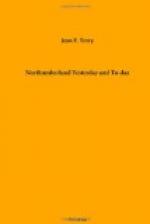For the next three hundred years Northumberland was swept by successive waves of raid and reprisal, in the course of which occurred the two well-known events, the attack of William the Lion of Scotland on Alnwick Castle, and the more famous affair still, the struggle between Percy and Douglas known as the battle of Otterburn, which was fought in “Chevy Chase” (Cheviot Forest). More important poetically than politically, it stands out more vividly in the records of the time than many other conflicts of larger import. The personal element in the fight, the deeds of gallantry recorded, the sounding roll of the chief knights’ names, and the high renown of the two leaders, throw a glamour around this particular contest which is kept alive by the ballads that chant the praises of Percy or Douglas according as the singer was Scot or Saxon. Sir Philip Sidney, that “verray parfit gentil knight” and discriminating litterateur, said “I never heard the old song of Percie and Douglas that I found not my hart mooved more than with a trumpet: and yet it is sung but by some blynd Crowder,[11] with no rougher voyce than rude stile! which beeing so evill apparelled in the dust and cobweb of that uncivill age, what wolde it work trimmed in the gorgeous eloquence of Pindare!” [Footnote 11: Crowder = fiddler.]
In the endless warfare of the Borders the second of two short-lived periods of truce had just expired, and an organised raid on a large scale was arranged by the Scots. The main body was to ravage Cumberland; and a smaller, but picked force led by Earls Douglas, Moray, and March came southward by way of Northumberland. But Northumbrian towers and towns knew nothing of their passing; they marched rapidly and by stealth into Durham, having crossed the Tyne between Corbridge and Bywell, and began to harry and lay waste the greener pastures and richer villages of the southern county, the smoke of whose burning homesteads was the first intimation to the unlucky English of the fact that a Scottish host was in their midst.
The Earl of Northumberland remained at Alnwick in the hope that he might be able to attack the Scots on their homeward journey; but he despatched his sons Henry Hotspur and Ralph in all haste to defend Newcastle. The Scots in due time appeared before the walls.
And he marched up to Newcastel
And rode it round about;
“O wha’s the lord o’
this castel?
Or wha’s the lady o’t?”
But up spake proud Lord Percy then,
And O but he spake hie!
“I am the lord o’ this castel,
My wife’s the lady gay.”
Douglas challenged Percy to meet him in single combat, and Percy promptly accepted. In the duel Percy was unhorsed, and Douglas captured his pennon and his gauntlet gloves, embroidered with the Percy lion in pearls. This trophy Douglas vowed he would carry off to Scotland with him, and set it in the topmost tower of his castle of Dalkeith, that it might be seen from afar. “By heaven! that you never shall,” replied Percy; “you shall not carry it out of Northumberland.” “Come and take it, then,” was Douglas’ answer; and Hotspur would have attempted its recovery there and then, but he was restrained by his knights. Douglas, however, said he would give Percy a chance to recover it, and agreed to await him at Otterburn.




